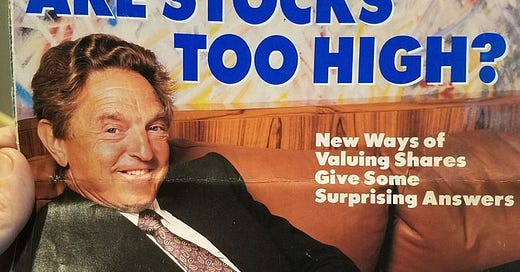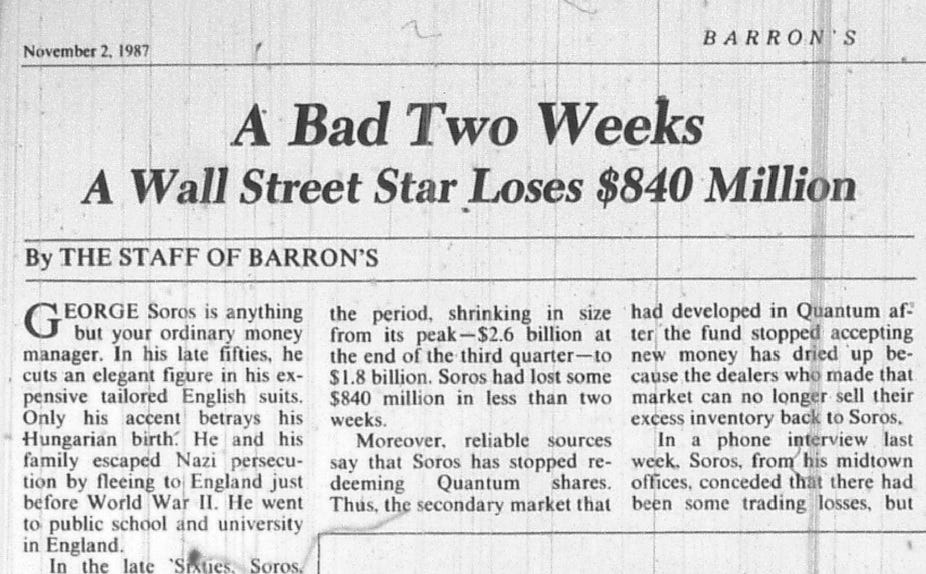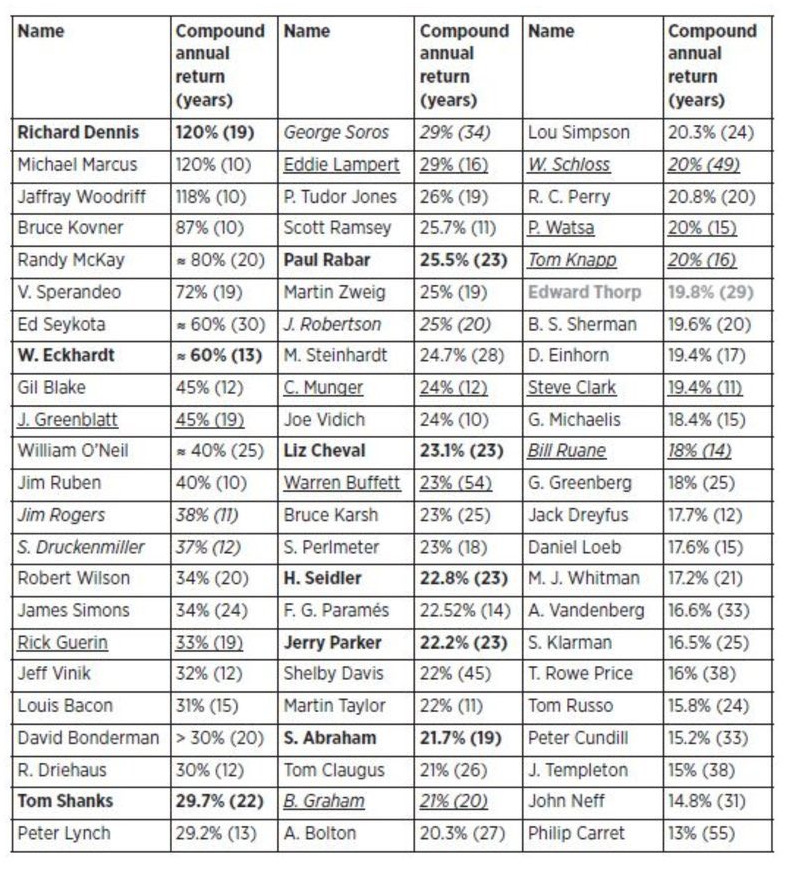Surviving Markets: Why Great Investors Are Rare
The first rule of compounding: never interrupt it unnecessarily. — Charlie Munger
After the crash of 1987, people seemed ready to write off George Soros. The master investor had been poorly positioned and caught off guard. Were stocks too high, Fortune had asked him earlier that year? Not necessarily, Soros argued. He was happy to ride the bull market and hedged himself by shorting the Japanese bubble where stocks were much more expensive.
This turned out to be a bad case of basis risk: American stocks collapsed under a cascade of selling while the Japanese market held up better. To make matters worse, Soros had shorted Japan with futures trading in Hong Kong. When the Hong Kong exchange briefly stopped trading in the wake of the turmoil, Soros found himself in limbo, unable to close out his position as Japanese markets bounced back. Not only was he hurting on both his long and short positions, what made the situation dangerous was the leverage he used.
Meanwhile, his protégé Druckenmiller had navigated the crash expertly, rapidly flipping back and forth between being long and short. After a short bounce, Druckenmiller expected further weakness and went short again. The next morning, he watched European markets weaken when he received a call from Salomon’s futures desk. A large speculator was dumping positions in a fire sale, 25 percent below the previous day’s closing price. Druckenmiller seized the opportunity to close out his shorts. With the selling pressure gone, the market stabilized and he switched long again. It was time to celebrate.
Druckenmiller called his mentor, reporting that the market was ready to bottom because “some crazy person just sold the hell out of this thing. Like, really recklessly.” That ‘crazy person’ had of course been Soros.
Leveraged and trapped in his Japanese shorts, Soros had become worried about survival. “I don’t understand what’s going on,” he told his traders and accepted the cost of a fire sale. “We’ve just got to move to cash. There’ll be another day to play.”
Playing another day.
What sounds so simple may be a key marker of the mindset of a great investor.
What do you notice in the below collection of track records (from Frederik Vanhaverbeke’s book Excess Returns; for another version see my Q&A with Scott Reardon).
First off, we have to take these numbers with a grain of salt. Evaluating and comparing track records is notoriously tricky, especially if provided without context and details. It’s rarely an apples to apples comparison. How much capital did they manage? How much (downside) volatility did they experience? Did they use leverage? Did they short? What was the portfolio turnover and therefore short-term and long-term taxable gains?
What metric is most relevant: absolute return, return net of fees, alpha relative to the market, or some measure of risk-adjusted net return? Another frequent phenomenon is that the overall track record is composed of two distinct ‘eras’, an early period of fantastic outperformance followed by average or underperformance (and asset gathering). Time vs. asset-weighted returns can vary substantially.
Leaving all these issues aside, what stands out to me is the rarity of great track records extending meaningfully beyond two decades.
Few people compound at high rates over many decades and through a variety of market regimes. And yet, as Morgan Housel so eloquently put it, longevity is crucial to success:
Effectively all of Warren Buffett’s financial success can be tied to the financial base he built in his pubescent years and the longevity he maintained in his geriatric years. His skill is investing, but his secret is time.
The best players of the game, by definition, survive. They prioritize playing another day over the chance to do a little better today. To do so, they study failure.
Warren and I learn a lot from other people’s mistakes. That is a much more pleasant way to learn hard lessons. We find it so interesting, the great variety of human mistakes and their causes. — Munger
In terms of reading financial history, I’ve always been absorbed with reading about disasters. The financial area will give you plenty of material if you like to be a follower of folly. We have been a student of other people’s folly, and it’s served us well. — Buffett
What would someone prevent from being a great investor with longevity? I can think of a few ways:
Classic ingredients for bad decisions: Ego, biases, and emotions.
Also, mistakes meeting overconfidence and concentration.
A failure to correct mistakes or adapt to change.
A lack of resilience in bear markets and drawdowns due to leverage or fragile capital structure.
Style drift into a game in which the investor has no edge.
Lastly, burnout.
A combination of these can derail even the most experienced operators. Consider Carl Icahn who has come under attack from short seller Hindenburg and recently shared some thoughts with the FT. Incredibly, the veteran activist and value investor lost billions shorting the market.
Icahn Enterprises “started aggressively betting on a market collapse in the aftermath of the 2008 financial crisis” with bets including “shorting broad market indices, individual companies, commercial mortgages and debt securities.”
Icahn’s bearish bets are the main reason his investment portfolio has lost money in every year since 2014. Over the roughly six year period that he lost $9bn on the short bets, the portfolio made about $6bn from his activist wagers, leaving the vehicle with an overall investment loss of nearly $3bn.
Icahn played the popular Wall Street pastime, “so you think you've spotted the next bubble?”
👉 The remainder of this post and the opportunity to reflect, share, and discuss in the comments are reserved for the community of subscribers who support my work. If you would like to join the conversation, consider subscribing.







